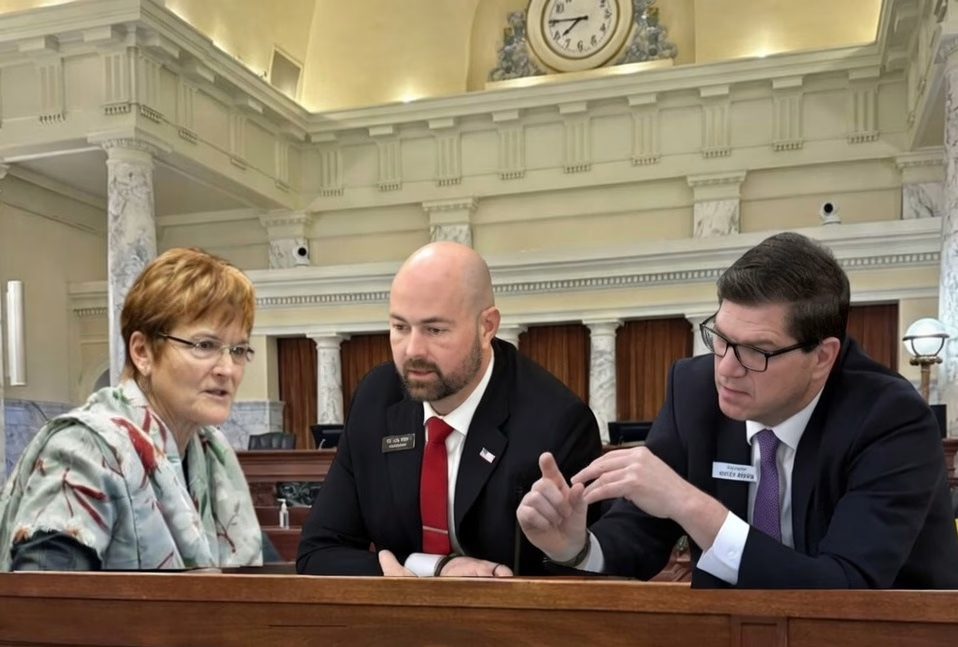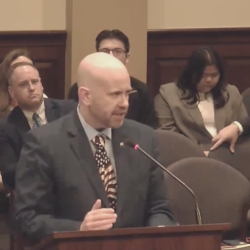After nearly two hours of debate, the House Judiciary, Rules, & Administration Committee voted to send House Bill 406 to the floor without recommendation.
Typically, committees that approve of bills will send them to the floor with a “do pass” recommendation. If the committee disapproves, they usually hold the bill in committee, which effectively kills it. Sending it to the floor with no recommendation is not unheard of. However, since 37 representatives have already signed on as cosponsors, H406 will nevertheless likely pass the House.
Rep. Kenny Wroten moved to send the bill to the floor with a “do pass” recommendation, but Rep. David Cannon made a substitute motion to send the bill to the amending order. Rep. Dan Garner moved to amend Cannon’s motion, instead moving to send the bill to the floor with no recommendation. This is the motion that eventually passed. The initial vote was 13-5 in favor, but Reps. Barb Ehardt, Marco Erickson, and Chris Allgood changed their no votes to yes, since they each planned to vote for the initial motion. That left the tally at 16-2, with only Democrats Don Coberly and John Gannon voting against.
I once again sat in the committee hearing room and live-tweeted the proceedings. Sen. Todd Lakey and Rep. Ted Hill, the bill sponsors, gave their closing arguments and then responded to questions from the committee. Lakey did a pretty thorough job of responding to the criticism from last week’s testimony.
He said that the “mixture” language, which says that any substance with a detectable amount of fentanyl will be treated by the law as if it was entirely fentanyl, was necessary, and congruent to what other states have on the books. He also pointed out that law enforcement personnel told him that the idea of marijuana being laced with fentanyl, a question that came up several times during testimony, was not common.
Lakey reiterated that passing this bill will cause dealers to avoid Idaho, but admitted it would not reduce fentanyl usage to zero.
Something I noticed about Lakey, Hill, and the supporters of the bill on the committee was that they did not want to talk about the details of the text. They said that law enforcement has been asking for mandatory minimums for fentanyl, and this bill does that, and that we shouldn’t worry about unintended consequences. Hill called those “distractions”.
Nevertheless, several committee members raised some serious concerns about the bill. Reps. David Cannon and Barb Ehardt had some pointed questions that neither Lakey nor Hill were able to answer conclusively. However, it did not matter in the end. As I wrote last weekend, the narrative has been set that you either support this bill or you support the drug dealers. Both Ehardt and Rep. Julianne Young lamented this, acknowledging that any criticism of the bill was going to be portrayed as insufficient support of law enforcement and used against them in the upcoming primary campaigns.
Rep. Chris Mathias, the only Democrat to vote to send H406 to the floor (edit – Mathias voted no, while Democrat Rep. John Gannon voted yes), said that while he trusts law enforcement more than his colleagues or his voters, he was still concerned with Sheriff Matt Clifford’s statement that “the law is a guideline.” He wanted a chance to amend the bill to add stronger language regarding intent, but recognized there was not enough support in the committee for that to happen.
Perhaps the most interesting exchange came late in the hearing when Rep. Marco Erickson of Idaho Falls broke down in tears as he related his work in drug prevention to the necessity of passing this bill. He said that there were several layers within society that are necessary to fight the drug problem, and that the law enforcement component needs this law to do its job. What I got out of Erickson’s statement was that we need government to fix this problem.
Rep. Heather Scott of Blanchard disagreed. “Government is not going to fix this problem… I do believe this bill will create more problems,” she said, adding that there is a deeper problem of moral decay in our society that government cannot address.
Rep. Julianne Young agreed. “Addiction is not going away. Drugs are not going away. This is one step in a journey, and we need to continue an open conversation.”
I worry that this bill is being sold to the public as a magic bullet that will somehow end the fentanyl crisis in our state before it gets out of control. While I hope that’s true, I also believe that it is foolish to put our trust in government. The problems that lead to drug abuse, crime, and heartbreak will not be solved in the Legislature but in our living rooms, our schools, our churches, and in our communities.
I am frustrated with the way in which bill supporters framed the narrative. I received several responses to my previous piece that asked why I supported drugs and crime, which obviously I do not. Yet many supporters of the bill have been either unwilling or unable to see past a binary view, that you either support this bill as written or you support drug dealers.
In any case, the bill will be debated on the House floor soon, perhaps as early as this week. Once passed it will face more debate in the Senate Judiciary & Rules Committee and then the whole Senate. I hope that once this law is on the books we can get some honest data about fentanyl and drug based crime going forward, as well as an honest reckoning of any unforeseen consequences. The authors of this bill have promised results, so let’s hold them to that promise.
Head over to Substack for a bonus subscriber note!
About Brian Almon
Brian Almon is the Editor of the Gem State Chronicle. He also serves as Chairman of the District 14 Republican Party and is a trustee of the Eagle Public Library Board. He lives with his wife and five children in Eagle.













